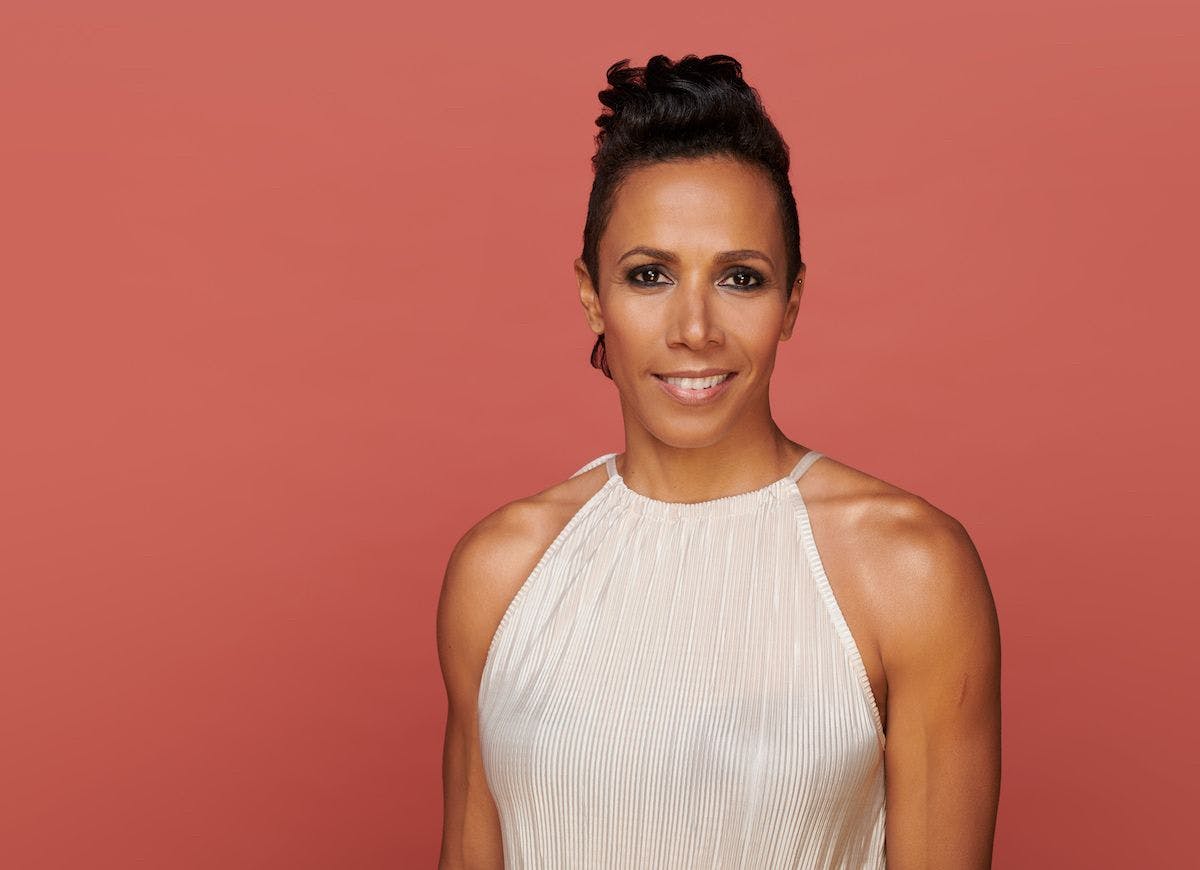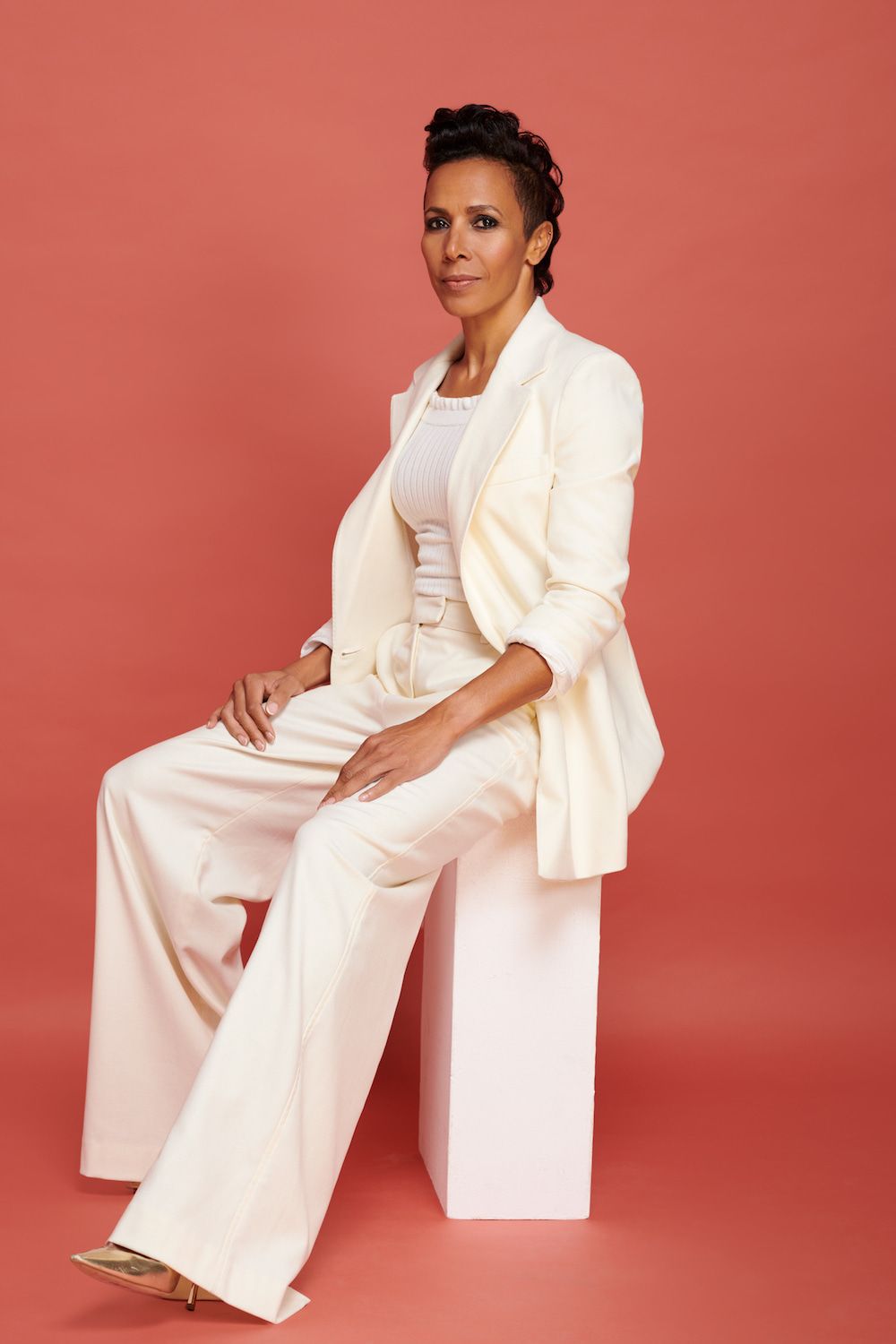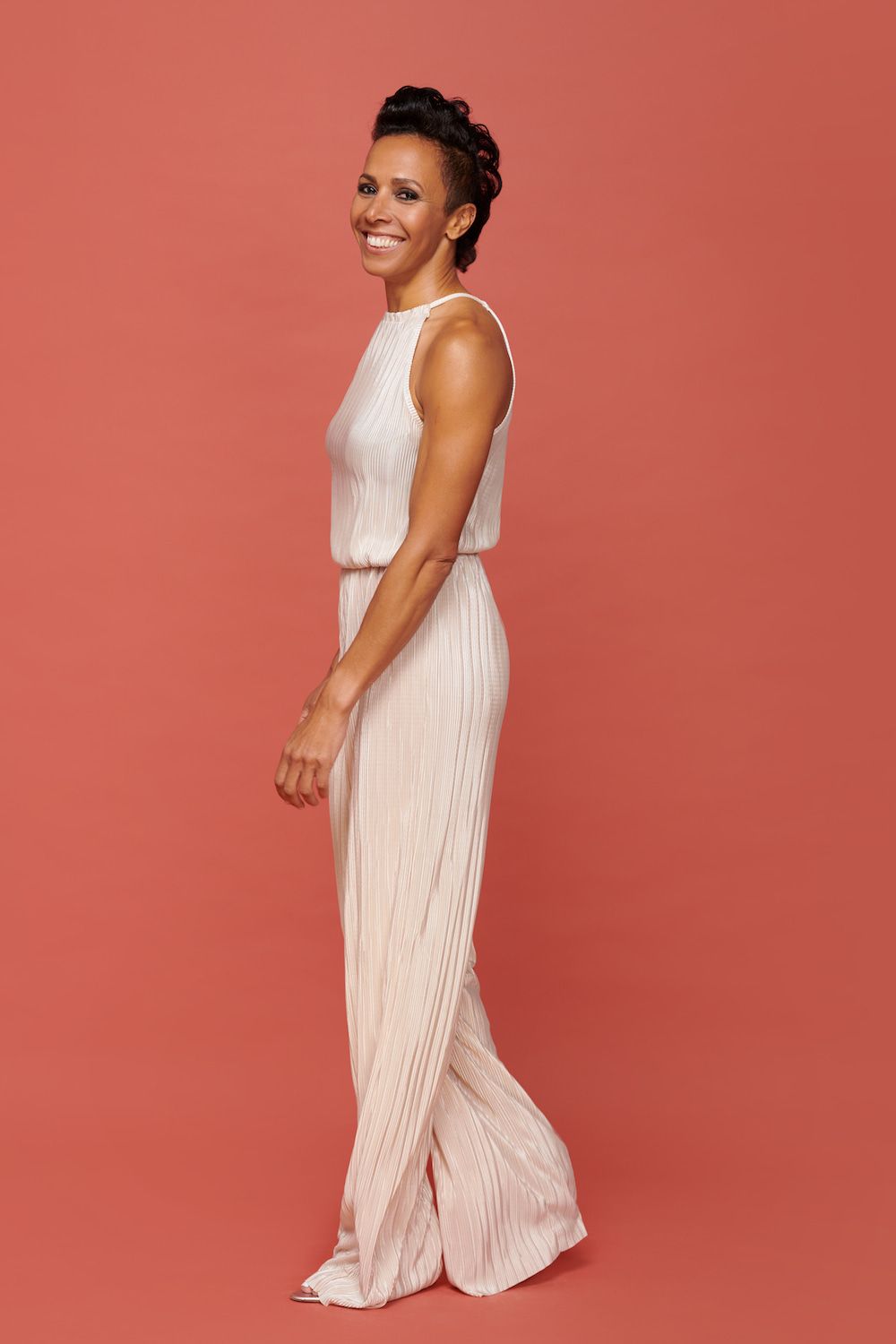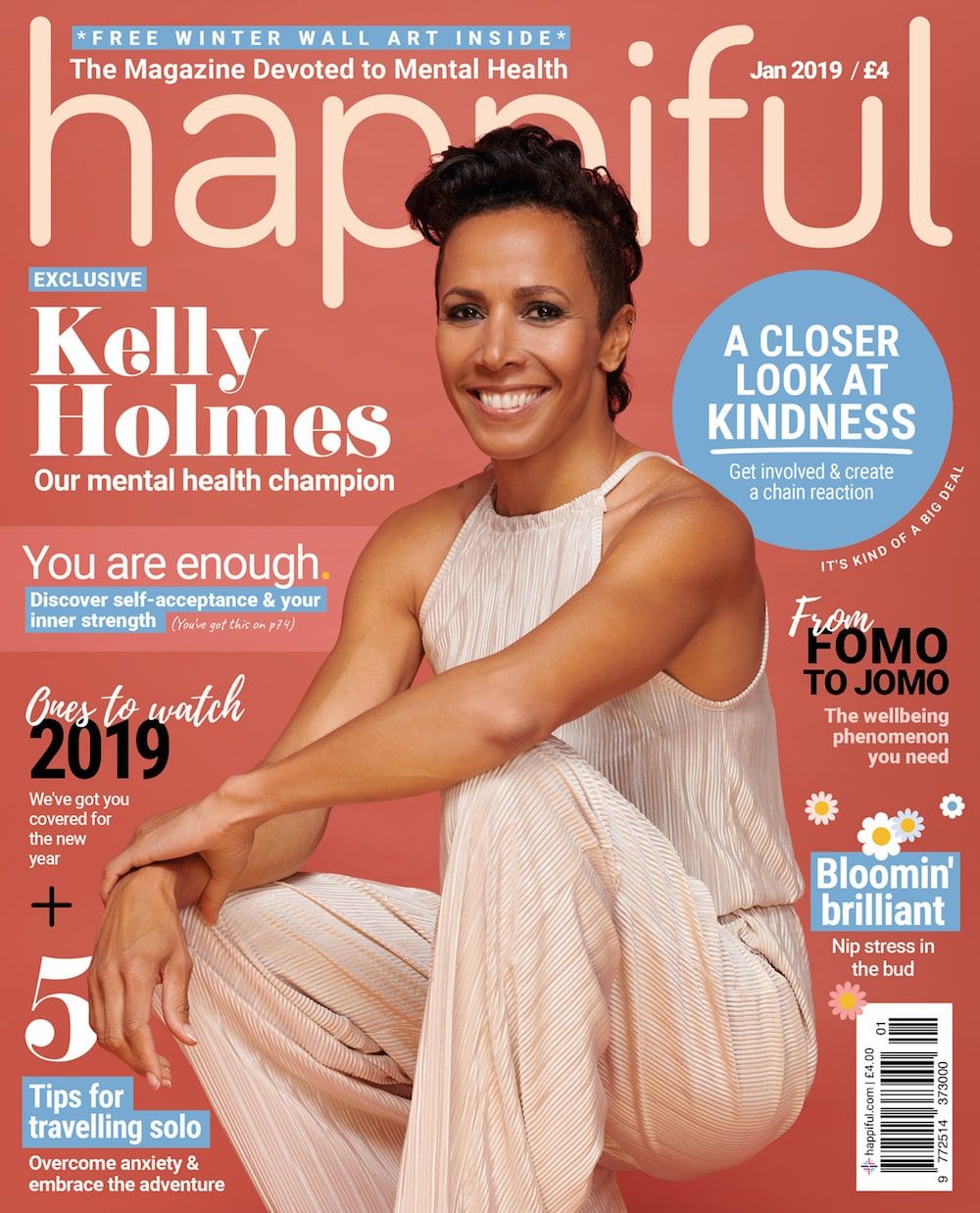Dame Kelly Holmes on Anxiety, Depression, Self-harm and Finding the Strength to Power Through
updated on Aug 1, 2019

Dame Kelly Holmes has inspired millions to reach for the stars, but behind closed doors she spent years in the grip of anxiety, depression and self-harm. Now, she’s using her experience to reach others, with a series of celebrity interviews for her podcast, What Do I Do? Here, the double Olympic athletics champion opens up to Happiful and explains how since the devastating loss of her mum, she is learning to more effectively manage her mental health
On a sun-drenched July afternoon in a leafy suburb of north London, Dame Kelly Holmes found herself in Alastair Campbell’s bathroom, perched on the toilet seat as the former political aide and author belted out a tune on his bagpipes.
“I thought: ‘I have done many things in my life, but I have never done this!’” chuckles Kelly, 48. Her expression changes to one of reflection. “I laugh about it being in a bathroom, just because it was a surreal environment, but to be there, in the place that makes him feel good, that was absolutely a privilege,” she explains.
“He was telling me how bad he was that day, how he didn’t want to get out of bed, and the fact that I was coming to his home gave him energy to get up. It was a really heartfelt interview. I was surprised how much he opened up.”

Photography | Joseph Sinclair
Famed for being the first British woman to become double Olympic champion after winning gold in the 800m and 1,500m in Athens in 2004, Kelly became an overnight national treasure and sporting icon, as recognised for her unrivalled on-track success as her subsequent charitable endeavours.
Back then, she spoke with heart about her passion for athletics, and her joy of realising her childhood Olympic dream at the age of 34, despite an injury-prone past. Yet part of her story was missing, until her 2008 autobiography, Black, White and Gold, laid bare a secret struggle with anxiety and depression, which sparked repeated, agonising episodes of self-harm. Since then, Kelly has spoken publicly about this episode of her life, in a bid to normalise the conversation about mental health.
Kelly’s new podcast What Do I Do?, which launches at the end of January, goes a step further and sees her talking to 10 high-profile people about their experiences of mental health, detailing the place or activity that enables them to find calm.
For Alastair Campbell, who had a nervous breakdown in the mid-80s and experiences ongoing periods of depression and psychosis, playing the bagpipes in his bathroom is a physical and emotional escape.
“He does it to feel like he’s breathing and having a distraction from his thoughts,” says Kelly, who has also spoken to Eddie Izzard, Rory Bremner, and Davina McCall, among others.
That Davina uses exercise to achieve balance should come as no surprise to those who understand her journey from drink and drug addict to TV presenter and, now, qualified personal trainer, so it made sense for the Long Lost Family presenter to challenge Kelly to a spin class when they recorded her podcast interview last month.
“She is so on it when she does her exercise, she’s like ‘woo hoo!’” laughs Kelly. “She had an addiction. She’s not addicted to training, but training makes her feel good so she continues. If you’ve been strong enough to come out of something like that, you’re probably strong enough to do anything.”
I’d go for a massage to work on the muscles in my legs, but there was nobody there to help me work on my mind
The same can be said for Kelly. When we meet, she is in London ahead of a speech at the Mental Health First Aid Conference that evening. Vocally confident and remarkably self-exposing, when the former army physical training instructor describes her mental health “journey” it seems a world away from the isolated and vulnerable place she was in three weeks before the 2003 World Athletics Championships in Paris when, locked in a bathroom at a training camp in the Pyrenees, Kelly self-harmed for the first time.
“The moment I looked in that mirror, I didn’t see myself. It came like a bolt,” she recalls. “I didn’t suddenly think: ‘I’m feeling sad.’ It wasn’t a gradual process.
It hit me like a ton of bricks. No one talked about mental health then. I’d go for a massage to work on the muscles in my legs, but there was nobody there to help me work on my mind.”
The self-harm was, Kelly realises now, a physical reaction to anxiety after being blighted by injury for seven of the 12 years she had raced professionally.
“Being one of the best athletes in the world and getting injured at the worst time, a big impact hits your brain. You have to deal with that while remaining focused. It was so hard,” she says.
Since the age of 14 and watching Sebastian Coe win gold in the 1,500m at the Los Angeles Olympics, Kelly was determined to become Olympic champion. Ten years in the army steeled her with the necessary fitness, ambition, drive, determination and resilience, but her obsession with only being the best was, she believes now, “unhealthy”.

Photography | Joseph Sinclair
“People say to me: ‘If staying active helps mental health, how did you get to that point?’ Staying fit and active and keeping the brain healthy is different to pushing yourself to such an extreme,” she says.
“My dream wasn’t to be a medallist or to be in a British team, it was to be an Olympic champion, so unless that was going to happen, nothing was good enough, so I was always fighting to be better.”
After the initial elation of winning bronze at the World Championships, despite running on an injured calf, Kelly felt dissatisfied.
“If you’ve wanted to be number one in the world, getting a bronze or silver could class as failure. In sport it’s very black and white,” she says.
At the peak of her troubles, Kelly was self-harming daily, but told nobody, partly because of the isolation she felt as a middle distance runner – “You’re just in your own shell. You don’t talk to anyone. You deal with that moment on your own every day” – but also to protect her professional reputation.
“The weakness was thinking: ‘I don’t want my opposition to think I’m vulnerable, or I’m not focused and tough.’ You don’t want the opposition to know you’re injured, let alone that you’re crying all the time. Standing on a podium with a medal around your neck, knowing what you’re going through and no one else does, that was a bit of a mind fuck,” says Kelly, adding that no one ever spotted her scars.
“I wore sports shorts and crop tops, so there are not that many places you can hide visible scars, but sometimes I’d just cover them with make up or I’d lie,” she says. “When you’re a runner, you’re going in brambles and getting scratched all the time.”
Despite a period of suicidal thoughts when she wanted “the floor to open up, to jump in it, for it to close up and to not be there”, Kelly didn’t quit.
“That dream of becoming Olympic champion was almost my saving grace,” she explains. “I could have given up sport and not had that emotional rollercoaster, but if I had I would have regretted it for the rest of my life, and I can’t live with regret.”
To read more of Kelly's exclusive chat with us, pick up the January issue of Happiful now.

3 Ways to Get Happiful Magazine
Happiful shop: Can't see your copy of Happiful in a store near you? Head to our online shop.
In-store: Pick up your copy in Waitrose, Tesco, Morrisons, WH Smiths Travel or Asda. Find a store near you.
Online: Happiful is completely free to read digitally. To get our January issue in your inbox this Thursday, subscribe now.
Photography | Joseph Sinclair
Hair and Make-up | Alice Theobald at Joy Goodman Cosmetics a La Carte, Barry M, Eylure lashes, and skincare by Sukin.
Styling | Krishan Parmar
If you are struggling with your mental health and need to talk, professional support may help. Use the bar below to enter your location and find a counsellor in your area:

